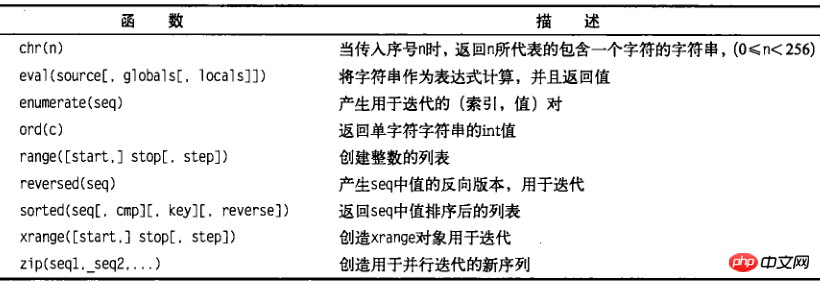Rumah >pembangunan bahagian belakang >Tutorial Python >python中条件、循环等介绍说明
python中条件、循环等介绍说明
- 高洛峰asal
- 2017-03-08 11:06:351557semak imbas
获取字典中任意的键-值对
>>> x={'a':1,'b':2}
>>> key,value=x.popitem()
>>> key,value
('a', 1)
>>> del x[key]
Traceback (most recent call last):
File "<pyshell#16>", line 1, in <module>
del x[key]
KeyError: 'a'
>>> x
{'b': 2}
>>> x[key]=value
>>> x
{'a': 1, 'b': 2}
>>> del x[key]增量赋值
>>> x=2 >>> x+=1 >>> x*=2 >>> x >>> fnord='foo' >>> fnord+='bar' >>> fnord*=2 >>> fnord 'foobarfoobar'
条件执行if语句
>>> name=raw_input('?') ?Yq Z >>> if name.endswith('Z'): \ print 'Hello,Mr.Z' Hello,Mr.Z
else子句
>>> name=raw_input('what is your name?')
what is your name?Yq Z
>>> if name.endswith('Z'):
print 'Hello,Mr.Z'
else:
print 'Hello,stranger'
Hello,Mr.Zelif子句
>>> num=input('Enter a number: ')
Enter a number: 5
>>> if num>0:
print 'The number is position'
elif num<0:
print 'The number is negative'
else:
print 'The number is zero'
The number is position条件嵌套语句
>>> name=raw_input('What is your name?')
What is your name?Yq Z
>>> if name.endswith('Yq'):
if name.startswith('Z'):
print 'Hello,Yq Z'
elif name.startswith('K'):
print 'Hello,Zyq'
else:
print 'Hello,Yq'
else:
print 'Hello,stranger'
Hello,stranger>>> number=input('Enter a number between 1 and 10:')
Enter a number between 1 and 10:6
>>> if number<=10 and number>=1:
print 'Great!'
else:
print 'Wrong!'
Great!>>> age=10
>>> assert 0<age<100
>>> age=-1
>>> assert 0<age<100
Traceback (most recent call last):
File "<pyshell#21>", line 1, in <module>
assert 0<age<100
AssertionErrorwhile循环
>>> x=1
>>> while x<=100:
print x
x+=1>>> while not name:
name=raw_input('Please enter your name:')
print 'Hello,%s !' % name
Please enter your name:zyq
Hello,zyq !for循环
>>> words=['this','is','an','ex','parrot']
>>> for word in words:
print word
this
is
an
ex
parrot
>>> range(0,10)
[0, 1, 2, 3, 4, 5, 6, 7, 8, 9]
>>> for i in range(1,8):
print i
2
4
6字典循环(迭代)
>>> d={'x':1,'y':2,'z':3}
>>> for key in d:
print key,'corresponds to',d[key]
y corresponds to 2
x corresponds to 1
z corresponds to 3并行迭代
>>> names=['Anne','Beth','George','Damon']
>>> ages=[12,19,18,20]
>>> for i in range(len(names)):
print names[i],'is',ages[i],'years old'
Anne is 12 years old
Beth is 19 years old
George is 18 years old
Damon is 20 years old>>> zip(names,ages)
[('Anne', 12), ('Beth', 19), ('George', 18), ('Damon', 20)]
>>> for name,age in zip(names,ages):
print name,'is',age,'years old'
Anne is 12 years old
Beth is 19 years old
George is 18 years old
Damon is 20 years old
>>> zip(range(5),xrange(100))
[(0, 0), (1, 1), (2, 2), (3, 3), (4, 4)]编号迭代
>>> d
[1, 2, 4, 4]
>>> for x in d:
if x==4:
d[d.index(x)]=6
>>> d
[1, 2, 6, 6]
>>> S=['skj','kiu','olm','piy']
>>> index=0>>> for s1 in S:
if 'k' in s1:
S[index]='HH'
index+=1
>>> S
['HH', 'HH', 'olm', 'piy']>>> for index,s2 in enumerate(S): #enumerate函数提供索引-值对
if 'H' in s2:
S[index]='DF'
>>> S
['DF', 'DF', 'olm', 'piy']翻转、排序迭代
>>> sorted([4,3,6,8,3]) [3, 3, 4, 6, 8] >>> sorted('Hello,world!') ['!', ',', 'H', 'd', 'e', 'l', 'l', 'l', 'o', 'o', 'r', 'w'] >>> list(reversed('Hello,world!')) ['!', 'd', 'l', 'r', 'o', 'w', ',', 'o', 'l', 'l', 'e', 'H'] >>> ''.join(reversed('Hello,world!')) '!dlrow,olleH'
break跳出循环
>>> for n in range(99,0,-1):
m=sqrt(n)
if m==int(m):
print n
breakwhile True/break
>>> while True:
word=raw_input('Please enter a word:')
if not word:break
print 'The word was '+word
Please enter a word:f
The word was f
Please enter a word:循环中的else语句
>>> for n in range(99,81,-1):
m=sqrt(n)
if m==int(m):
print m
break
else:
print 'h'
h列表推导式-轻量级循环
>>> [x*x for x in range(10)]
[0, 1, 4, 9, 16, 25, 36, 49, 64, 81]
>>> [x*x for x in range(10) if x%3==0]
[0, 9, 36, 81]
>>> [(x,y) for x in range(3) for y in range (3)]
[(0, 0), (0, 1), (0, 2), (1, 0), (1, 1), (1, 2), (2, 0), (2, 1), (2, 2)]
>>> result=[]
>>> for x in range(3):
for y in range(3):
result.append((x,y))
>>> result
[(0, 0), (0, 1), (0, 2), (1, 0), (1, 1), (1, 2), (2, 0), (2, 1), (2, 2)]
>>> girls=['Alice','Bernice','Clarice']
>>> boys=['Chris','Arnold','Bob']
>>> [b+'+'+g for b in boys for g in girls if b[0]==g[0]]
['Chris+Clarice', 'Arnold+Alice', 'Bob+Bernice']pass
>>> if name=='Nsds':
print 'Welcome!'
elif name=='UK':
#还没完
pass
elif name=='Bill':
print 'Access Denied'
else:
print 'Nobody!'del x和y同时指向一个列表,但是删除x并不会影响y。删除的只是名称,不是列表本身(值)
>>> x=['Hello','world'] >>> y=x >>> y[1]='Python' >>> x ['Hello', 'Python'] >>> del x >>> y ['Hello', 'Python']
exec
>>> exec "print 'Hello,world!'"
Hello,world!
>>> from math import sqrt
>>> exec "sqrt=1"
>>> sqrt(4)
Traceback (most recent call last):
File "<pyshell#36>", line 1, in <module>
sqrt(4)
TypeError: 'int' object is not callable
#增加一个字典,起到命名空间的作用
>>> from math import sqrt
>>> scope={}
>>> exec 'sqrt=1' in scope
>>> sqrt(4)
2.0
>>> scope['sqrt']注意:命名空间,称作作用域。可以把它想象成保存变量的地方,类似于不可见的字典。执行 x=1这类赋值语句时,就将键x和值1放在当前的命名空间内,这个命名空间一般来说都是全局命名空间。
>>> len(scope)2 >>> scope.keys() ['__builtins__', 'sqrt']
eval 求值
>>> scope={}
>>> scope['x']=2
>>> scope['y']=3
>>> eval('x*y',scope)
>>> scope={}
>>> exec 'x=2' in scope
>>> eval('x*x',scope)
Atas ialah kandungan terperinci python中条件、循环等介绍说明. Untuk maklumat lanjut, sila ikut artikel berkaitan lain di laman web China PHP!
Kenyataan:
Kandungan artikel ini disumbangkan secara sukarela oleh netizen, dan hak cipta adalah milik pengarang asal. Laman web ini tidak memikul tanggungjawab undang-undang yang sepadan. Jika anda menemui sebarang kandungan yang disyaki plagiarisme atau pelanggaran, sila hubungi admin@php.cn
Artikel sebelumnya:python dict字典详细说明Artikel seterusnya:Python正则表达式总结

